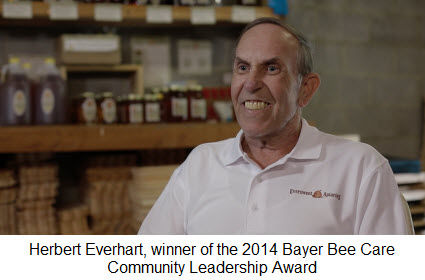West Virginia Beekeeper, Farmer and Entrepreneur Wins 2014 Bayer CropScience Bee Care Community Leadership Award
June 17, 2014
WASHINGTON, D.C. (June 18, 2014) – As a disabled Vietnam veteran who lost a leg in the war, West Virginia beekeeper Herbert Everhart, owner of Eversweet Apiaries, was a natural choice to help start what may be the first beekeeping program for veterans in the United States.
Sponsored by the West Virginia Eastern Panhandle Beekeeping Association, the two-year program is designed to educate veterans on all aspects of beekeeping, including establishing hives and marketing their products.
Everhart’s efforts have earned his community the 2nd Annual Bayer Bee Care Community Leadership Award sponsored by the North American Bayer Bee Care Program. Presented during National Pollinator Week, the award recognizes an individual who has harnessed the power of the honey bee colony to create innovative projects that benefit a community. The award provides a $5,000 grant to the winner’s organization, which can be used to support a community beekeeping project.

“I am honored to be chosen to receive this year’s Bee Care Community Leadership Award,” said Everhart,
who is being recognized during a reception today in Washington, D.C. “The grant will enable us to expand our project significantly. In addition to supporting the veterans program, some of the funds will also be used to support our beekeeping program targeted toward youth.”
Bayer received numerous nominations from across the country. Each applicant had to provide the following information to be considered for the award:
- Description of project that leverages the power of a honey bee hive and beekeeping to benefit a community;
- Answers to a set of essay questions; and
- Submission of a letter of reference from an apiarist, community organization or member of a relevant organization, such as a beekeeping association.
“The impact of Herbert’s efforts to improve the community around him by teaching others about the value of honey bees to our food supply is exactly what the Bee Care Award exemplifies," said Dr. Becky Langer, project manager of the North American Bayer Bee Care Program. “Each year, Herbert mentors several veterans and youth to ensure they know the proper way to handle honey bee colonies so they are healthy and thrive.”
The entries were judged by a four-person panel that included Kim Flottum, editor of Bee Culture magazine; Darren Cox, vice president of the American Honey Producers Association; Dr. David Tarpy, associate professor and extension apiculturist at North Carolina State University; and Dick Rogers, research manager and entomologist of the North American Bayer Bee Care Center. During the reception, Dr. Langer also expressed Bayer’s appreciation to the judges for taking time from their busy schedules to help choose the winner.
“I commend Bayer for sponsoring this beneficial award,” said Kim Flottum, editor of Bee Culture magazine. “I think it reminds us all of the vital connection honey bees can play, not only in producing the best part of our food supply, but in doing so they bring all people in the global community a step closer to each other.”
The Bee Care Community Leadership Award and Congressional reception are only two of the activities Bayer is conducting during National Pollinator Week, which is June 16-22. Bayer is also collaborating with the University of the District of Columbia (UDC) Master Gardeners Program to plant a pollinator garden at The SEED Public Charter School of Washington, D.C. SEED students will participate in planting the pollinator garden and gain hands-on experience in learning about the importance of honey bees to sustainable agriculture.
Bayer’s participation in National Pollinator Week is a part of the company’s more than 25-year commitment to supporting bee health. In April, Bayer opened its Bee Care Center in North America, a 6,000-square-foot facility focused on research and collaboration for a wide range of stakeholders concerned about bee health.
###
Bayer CropScience Twitter Page:
http://twitter.com/bayer4cropsus
http://twitter.com/bayerbeecare
Bayer CropScience Blog:
http://connect.bayercropscience.us
Bayer CropScience is committed to bringing new technology and solutions for agriculture and non-agricultural uses. For questions concerning the availability and use of products, contact a local Bayer CropScience representative, or visit Bayer CropScience online at www.bayercropscience.us.
###
Visit the Bayer Connect - Social Hub for all Bayer CropScience social media, recent news, blog posts, videos and more.
About Bayer CropScience
Bayer is a global enterprise with core competencies in the fields of health care, agriculture and high-tech materials. Bayer CropScience, the subgroup of Bayer AG responsible for the agricultural business, has annual sales of EUR 8,819 million (2013) and is one of the world’s leading innovative crop science companies in the areas of seeds, crop protection and non-agricultural pest control. The company offers an outstanding range of products including high value seeds, innovative crop protection solutions based on chemical and biological modes of action as well as an extensive service backup for modern, sustainable agriculture. In the area of non-agricultural applications, Bayer CropScience has a broad portfolio of products and services to control pests from home and garden to forestry applications. The company has a global workforce of 22,400 and is represented in more than 120 countries. This and further news is available at: www.press.bayercropscience.com.
Contact:
Bayer CropScience Media Hotline, 1-877-879-6162, or
Beth Roden
Head of Communications & Bayer CropScience NA Coordinator
Bayer CropScience
Tel: (919) 549-2030
Email: beth(dot)roden(at)bayer(dot)com
Catharine Montgomery
Porter Novelli
Tel: (404) 995-4521
Email: Catharine(dot)Montgomery(at)porternovelli(dot)com
USA-BCS-2014-0130
Find more information at www.bayercropscience.us.
Forward-Looking Statements
This release may contain forward-looking statements based on current assumptions and forecasts made by Bayer Group or subgroup management. Various known and unknown risks, uncertainties and other factors could lead to material differences between the actual future results, financial situation, development or performance of the company and the estimates given here. These factors include those discussed in Bayer’s public reports which are available on the Bayer website at www.bayer.com. The company assumes no liability whatsoever to update these forward-looking
Disclaimer
Always read and follow pesticide label directions, insect resistance management requirements (where applicable), and grain marketing and all other stewardship practices.